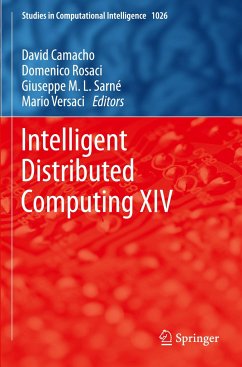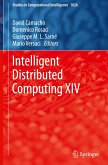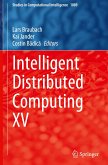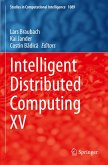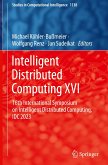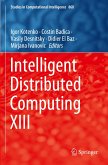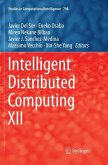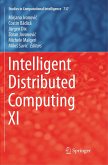Intelligent Distributed Computing XIV
Herausgegeben:Camacho, David; Rosaci, Domenico; Sarné, Giuseppe M. L.; Versaci, Mario
Intelligent Distributed Computing XIV
Herausgegeben:Camacho, David; Rosaci, Domenico; Sarné, Giuseppe M. L.; Versaci, Mario
- Broschiertes Buch
- Merkliste
- Auf die Merkliste
- Bewerten Bewerten
- Teilen
- Produkt teilen
- Produkterinnerung
- Produkterinnerung
This book collects 43 regular papers received from 18 countries that present innovative advances in intelligent and distributed computing, encompassing both architectural and algorithmic results related to these fields. Significant attention is given to new models, techniques, and applications for distributed intelligent architectures and high-performance architectures, machine learning techniques, Internet of Things, blockchain, intelligent transport systems, data analytics, trust and reputation systems, and many others. The book includes the peer-reviewed proceedings of the 14th…mehr
Andere Kunden interessierten sich auch für
![Intelligent Distributed Computing XIV Intelligent Distributed Computing XIV]() Intelligent Distributed Computing XIV246,09 €
Intelligent Distributed Computing XIV246,09 €![Intelligent Distributed Computing XV Intelligent Distributed Computing XV]() Intelligent Distributed Computing XV169,99 €
Intelligent Distributed Computing XV169,99 €![Intelligent Distributed Computing XV Intelligent Distributed Computing XV]() Intelligent Distributed Computing XV169,99 €
Intelligent Distributed Computing XV169,99 €![Intelligent Distributed Computing XVI Intelligent Distributed Computing XVI]() Intelligent Distributed Computing XVI169,99 €
Intelligent Distributed Computing XVI169,99 €![Intelligent Distributed Computing XIII Intelligent Distributed Computing XIII]() Intelligent Distributed Computing XIII193,99 €
Intelligent Distributed Computing XIII193,99 €![Intelligent Distributed Computing XII Intelligent Distributed Computing XII]() Intelligent Distributed Computing XII154,99 €
Intelligent Distributed Computing XII154,99 €![Intelligent Distributed Computing XI Intelligent Distributed Computing XI]() Intelligent Distributed Computing XI77,99 €
Intelligent Distributed Computing XI77,99 €-
-
-
This book collects 43 regular papers received from 18 countries that present innovative advances in intelligent and distributed computing, encompassing both architectural and algorithmic results related to these fields. Significant attention is given to new models, techniques, and applications for distributed intelligent architectures and high-performance architectures, machine learning techniques, Internet of Things, blockchain, intelligent transport systems, data analytics, trust and reputation systems, and many others. The book includes the peer-reviewed proceedings of the 14th International Symposium on Intelligent Distributed Computing (IDC 2021), which was held in online mode due to the COVSARS2 pandemic situation, during September 16-18, 2021.
The IDC 2021 event included sessions on Internet of Things, data analytics, machine learning, multi-agent systems, algorithms, future intelligent transport solutions, blockchain, intelligent distributed computingfor cyber-physical security, and security and trust and reputation in intelligent environments.
The IDC 2021 event included sessions on Internet of Things, data analytics, machine learning, multi-agent systems, algorithms, future intelligent transport solutions, blockchain, intelligent distributed computingfor cyber-physical security, and security and trust and reputation in intelligent environments.
Produktdetails
- Produktdetails
- Studies in Computational Intelligence 1026
- Verlag: Springer / Springer International Publishing / Springer, Berlin
- Artikelnr. des Verlages: 978-3-030-96967-7
- 1st edition 2022
- Seitenzahl: 496
- Erscheinungstermin: 8. Mai 2023
- Englisch
- Abmessung: 235mm x 155mm x 27mm
- Gewicht: 744g
- ISBN-13: 9783030969677
- ISBN-10: 3030969673
- Artikelnr.: 67756570
- Herstellerkennzeichnung Die Herstellerinformationen sind derzeit nicht verfügbar.
- Studies in Computational Intelligence 1026
- Verlag: Springer / Springer International Publishing / Springer, Berlin
- Artikelnr. des Verlages: 978-3-030-96967-7
- 1st edition 2022
- Seitenzahl: 496
- Erscheinungstermin: 8. Mai 2023
- Englisch
- Abmessung: 235mm x 155mm x 27mm
- Gewicht: 744g
- ISBN-13: 9783030969677
- ISBN-10: 3030969673
- Artikelnr.: 67756570
- Herstellerkennzeichnung Die Herstellerinformationen sind derzeit nicht verfügbar.
Part 1: INTERNET OF THINGS (Main Track) - Chair: David Camacho.- EBASI: IoT-Based Emotion and Behaviour Recognition System Against Elderly People Social Isolation.- Smart Health Services based on IoT and GIS.- A Review of Internet of Things Platforms through the IoT-A Reference Architecture.- Critical comparison of data imputation techniques at IoT Edge.- A novel approach for calculating real-time Composite Indicators relying on Internet of Things and Industrial Data Spaces.- Part 2: MACHINE LEARNING (Main Track) - Chair: Antonio Guerrieri.- Using evolving ensembles to deal with concept drift in streaming scenarios.- Applying of machine learning for analyzing network traffic in the conditions of an unbalanced data sample.- A WNN-based approach for Network Intrusion Detection.- A Force Field Reinforcement Learning approach for the observation problem.- Macro Architecture for Microservices: Improving Internal Quality of Microservice Systems.- An Artificial Neural Network to simulate surface runoff and soil erosion in burned forests.- Part 3: FITS (Special Session) - Chair: Maria Nadia Postorino.- Cooperative Negotiation in Connected Vehicles for Mitigating Traffic Congestion.- New Challenges for Urban Air Mobility systems: Aerial Cooperative Vehicles.- Combining Coordination Strategies for Autonomous Vehicles in Intersection Networks.- Using Boundary Objects and ANT Concepts to Implement Multi-Agent Systems as Drivers of Innovation in Logistics.- Traffic flow modelling when autonomous vehicles coexist with human driven vehicles: perspectives and challenges.- Distributed Non-monotonic Reasoning for Transportation Network Congestion Monitoring: Theoretical Foundation.- Part 4: IDCCPSS 1 (Special Session) - Chair: Igor Kotenko.- Using clustering methods of anomalies and neural networks to conduct additional diagnostics of a computer network.- Attack strategies and countermeasures in transport-based time synchronization solutions.- An approach to automated assessment of the image of a territorial entity in the media discourse of a foreign state.- FL4J - Federated Learning Framework for Java.- Part 5: BLOCKCHAIN (Main Track) - Chair: Daniele Santamaria.- Ontological Smart Contracts in OASIS: Ontology for Agents, Systems, and Integration of Services.- Blockchains through ontologies: the case study of the Ethereum ERC721 standard in OASIS.- Preselection Based Leader Election in Distributed Systems.- Physical Assets Tokenization for Blockchain Markets.- Part 6: MAS & ALGORITHMS (Main Track) - Chair: Fabrizio Messina.- Intelligent agents for diffused cyber-physical museums.- T-pattern: A way to model complex trustworthiness in a social multi-agent community.- An Algorithmic Proposal for the Qualitative Comparison between the Chen-Yeh EIT Mixture Model and the Susan-Resiga GSMs Experimental Model for MR Fluids.- DataX: A system for Data eXchange and transformation of streams.- Monitoring hierarchical systems for safety assurance.- Part 7:DATA ANALTICS (Main Track) - Chair: Michele Malgeri.- Preliminary characterization of Italian academic scholars by their bibliometrics.- ERAKS - Interactive Interface to Annotate Entities, Co-references, and Relationships.- Graph Theory Applied to Brain Network Analysis in Alzheimer's Disease.- Detection of postpartum depression-related posts: An analysis for Serbian.- smartTeV - Leveraging eVoting with Smart Voting Ballots.- Part 8: IDCCPSS 2 (Special Session) - Chair: Vasily Desnitsky.- A technique for the design of abstract models of microcontroller-based physical security systems.- An approach to the synthesis of a neural network system for diagnosing computer incidents.- Approach to Anomaly Detection in Cyber-Physical Object Behavior.- Security analysis of information systems based on attack sequences generation and testing.- TRIE (Special Session) & COMPUTING.- A Comparative Analysis of a Designed CNN and AlexNet for Image Classification on Small Datasets.- A Clustering Reputation-based Framework in Edge-based IoT Environments.- On Next-Generation Sequencing compression via Multi-GPU.- Experimental Approach of the Quantum Volume on Different Quantum Computing Devices.
Part 1: INTERNET OF THINGS (Main Track) - Chair: David Camacho.- EBASI: IoT-Based Emotion and Behaviour Recognition System Against Elderly People Social Isolation.- Smart Health Services based on IoT and GIS.- A Review of Internet of Things Platforms through the IoT-A Reference Architecture.- Critical comparison of data imputation techniques at IoT Edge.- A novel approach for calculating real-time Composite Indicators relying on Internet of Things and Industrial Data Spaces.- Part 2: MACHINE LEARNING (Main Track) - Chair: Antonio Guerrieri.- Using evolving ensembles to deal with concept drift in streaming scenarios.- Applying of machine learning for analyzing network traffic in the conditions of an unbalanced data sample.- A WNN-based approach for Network Intrusion Detection.- A Force Field Reinforcement Learning approach for the observation problem.- Macro Architecture for Microservices: Improving Internal Quality of Microservice Systems.- An Artificial Neural Network to simulate surface runoff and soil erosion in burned forests.- Part 3: FITS (Special Session) - Chair: Maria Nadia Postorino.- Cooperative Negotiation in Connected Vehicles for Mitigating Traffic Congestion.- New Challenges for Urban Air Mobility systems: Aerial Cooperative Vehicles.- Combining Coordination Strategies for Autonomous Vehicles in Intersection Networks.- Using Boundary Objects and ANT Concepts to Implement Multi-Agent Systems as Drivers of Innovation in Logistics.- Traffic flow modelling when autonomous vehicles coexist with human driven vehicles: perspectives and challenges.- Distributed Non-monotonic Reasoning for Transportation Network Congestion Monitoring: Theoretical Foundation.- Part 4: IDCCPSS 1 (Special Session) - Chair: Igor Kotenko.- Using clustering methods of anomalies and neural networks to conduct additional diagnostics of a computer network.- Attack strategies and countermeasures in transport-based time synchronization solutions.- An approach to automated assessment of the image of a territorial entity in the media discourse of a foreign state.- FL4J - Federated Learning Framework for Java.- Part 5: BLOCKCHAIN (Main Track) - Chair: Daniele Santamaria.- Ontological Smart Contracts in OASIS: Ontology for Agents, Systems, and Integration of Services.- Blockchains through ontologies: the case study of the Ethereum ERC721 standard in OASIS.- Preselection Based Leader Election in Distributed Systems.- Physical Assets Tokenization for Blockchain Markets.- Part 6: MAS & ALGORITHMS (Main Track) - Chair: Fabrizio Messina.- Intelligent agents for diffused cyber-physical museums.- T-pattern: A way to model complex trustworthiness in a social multi-agent community.- An Algorithmic Proposal for the Qualitative Comparison between the Chen-Yeh EIT Mixture Model and the Susan-Resiga GSMs Experimental Model for MR Fluids.- DataX: A system for Data eXchange and transformation of streams.- Monitoring hierarchical systems for safety assurance.- Part 7:DATA ANALTICS (Main Track) - Chair: Michele Malgeri.- Preliminary characterization of Italian academic scholars by their bibliometrics.- ERAKS - Interactive Interface to Annotate Entities, Co-references, and Relationships.- Graph Theory Applied to Brain Network Analysis in Alzheimer's Disease.- Detection of postpartum depression-related posts: An analysis for Serbian.- smartTeV - Leveraging eVoting with Smart Voting Ballots.- Part 8: IDCCPSS 2 (Special Session) - Chair: Vasily Desnitsky.- A technique for the design of abstract models of microcontroller-based physical security systems.- An approach to the synthesis of a neural network system for diagnosing computer incidents.- Approach to Anomaly Detection in Cyber-Physical Object Behavior.- Security analysis of information systems based on attack sequences generation and testing.- TRIE (Special Session) & COMPUTING.- A Comparative Analysis of a Designed CNN and AlexNet for Image Classification on Small Datasets.- A Clustering Reputation-based Framework in Edge-based IoT Environments.- On Next-Generation Sequencing compression via Multi-GPU.- Experimental Approach of the Quantum Volume on Different Quantum Computing Devices.

